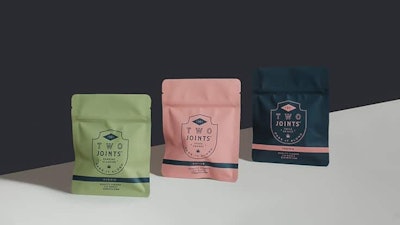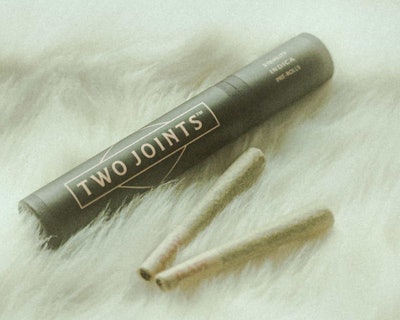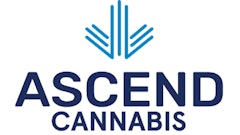
The week of May 24, Michigan’s vertically integrated Green Peak Innovations (GPI) and the nonprofit Last Prisoner Project (LPP) plan to launch a new brand, Two Joints. One percent of proceeds from Two Joints products sold in GPI’s Skymint provisioning centers will go toward LPP and its mission of advocating for criminal justice reform around cannabis crimes.
“When my partner, Jeff Radway, and I started Green Peak, we knew that Michigan was marching towards legalization, and we thought a big part of that effort needed to include criminal-record expungement of nonviolent marijuana offenders,” said Joe Neller, GPI’s co-founder and chief government affairs officer.
RELATED: Where Are They Now: Q&A with Jeff Radway
Green Peak’s team was looking for an organization to partner with on this effort, Neller said, and while many said they wouldn’t accept money from cannabis companies, LPP said it would.
LPP works with industry partners on brands, as it has with GPI on Two Joints, and in other ways, said Sarah Gersten, executive director and general counsel for LPP. “We have several industry partners that simply choose to donate proceeds from their total revenue to the organization,” she said. “We have folks that assist us in giving back through mentorship programs, with our reentry program, providing education, things like that.”

To start, Two Joints products will be available in Green Peak’s Skymint dispensaries in Ann Arbor, Bay City, Lansing and White Cloud, Mich. The dispensaries will package and sell Two Joints-branded eighth-ounce bags of flower and pre-rolls with LPP’s logo and website printed on the packaging, indexed at a lower value than Skymint’s other eighths and pre-rolls. This scope could expand in the future, Neller said.
“We're really excited about the partnership,” Neller said. “We think it's an important cause, and it feels good to do good. When you look at the arrest statistics, it's shameful that Michigan still [arrested] over 20,000 people every year for possession leading up to the legalization in 2018. We’re almost a year and a half after that, and our state still hasn't done anything on criminal-record expungement or clemency for what are largely very small infractions. And it's time that we do something about it.”
Laurie Gregory, GPI’s chief brand and product officer, shed some light on the concept of packaging two pre-rolls and the Two Joints name. “The name Two Joints refers to the shareable nature of our products, which inspire our customers to ask themselves, ‘What would you do with two joints?’” she said. “We have come a long way since the 1960s, when possessing just two joints could result in a 10-year jail sentence. At the same time, we know how far we have to go, and we are eager to help Last Prisoner Project shed light on wrongful incarcerations and rebuild lives.”
Neller, who worked in traditional health care lobbying before joining Michigan’s medical marijuana industry in 2017, said he and his team have been working to pass a series of criminal-record "clean slate" and expungement bills in the state, House Bills 4980-4985. Taking into account factors such as the type and number of crimes committed, the bills would clear convictions of and increase expungement eligibility for nonviolent crimes. Marijuana offenses that were committed before adult-use legalization but that are no longer offenses post-legalization would be eligible for expungement, Neller said.
RELATED: How Green Peak Innovations Is Navigating the Early Days of Medical Cannabis in Michigan
Team members at Green Peak have helped LPP with mentorship and job placement, including jobs at Green Peak, Gersten said. They have also lent government-relations help on policy initiatives and lobbying.
Ahead of the launch of Two Joints, LPP continues its involvement in multiple other industry partnerships. LPP board member Damian Marley and Ocean Grown Extracts recently launched a product called "Evidence." “The product packaging is made to look like an evidence bag in a criminal offense of marijuana,” Gersten said. And 4Front Ventures and its Mission Dispensaries have teamed up with LPP on a letter-writing campaign, in addition to other initiatives like recently manufacturing hand sanitizer at one of their manufacturing facilities and helping LPP donate it to correctional facilities.
For months, LPP has been working to help clear jails of prisoners amid the coronavirus pandemic. “We set up a pretty robust compassionate-release program where we pair our constituents—particularly those that might be at risk to the virus, those that are part of the aging population, have underlying health conditions—with pro bono attorneys to actually take on their compassionate-release cases,” Gersten said. “And we're just starting to see the fruits of those labors.”
LPP had to wait 30 days after submitting a request with the Bureau of Prisons to take cases to court, she said, but judges are now starting to decide on compassionate-release cases.
“We are hopeful that judges and executives that have power in the states over releasing people will start to see the urgent need to do that and [we’ll] actually start to see some more movement on the prison level,” Gerseten said. “… We have successfully now engaged some industry partners to get donations into facilities, so we had a couple partnerships where we got hand sanitizer and masks into correctional facilities for inmates."


























